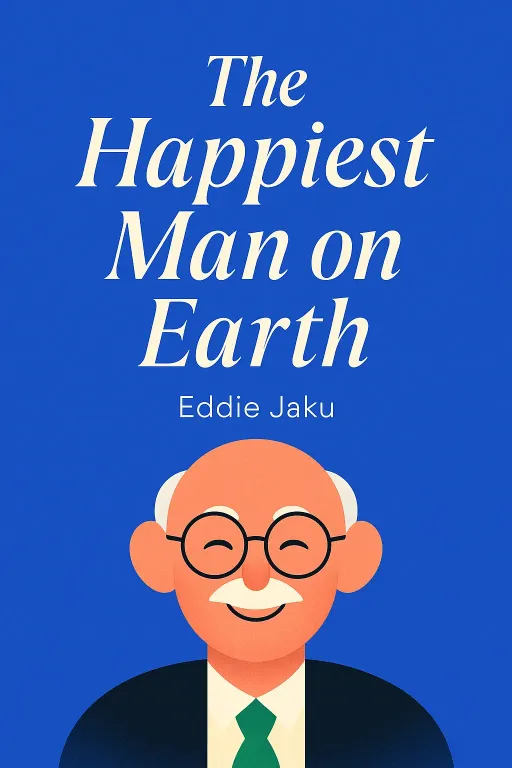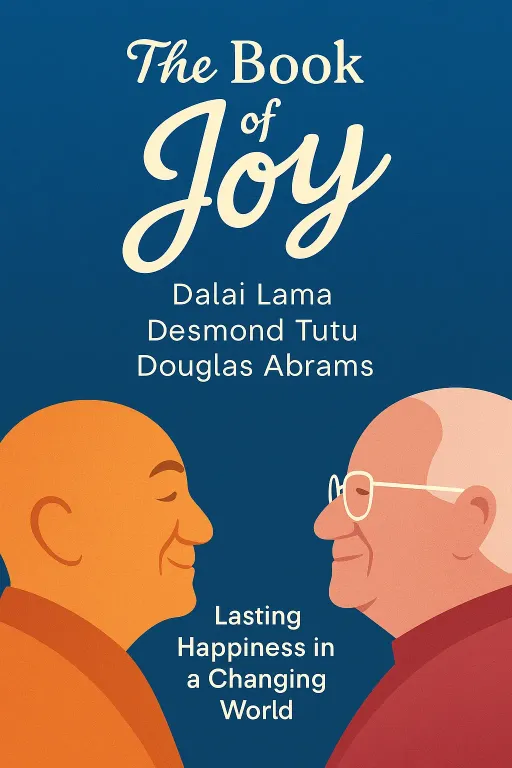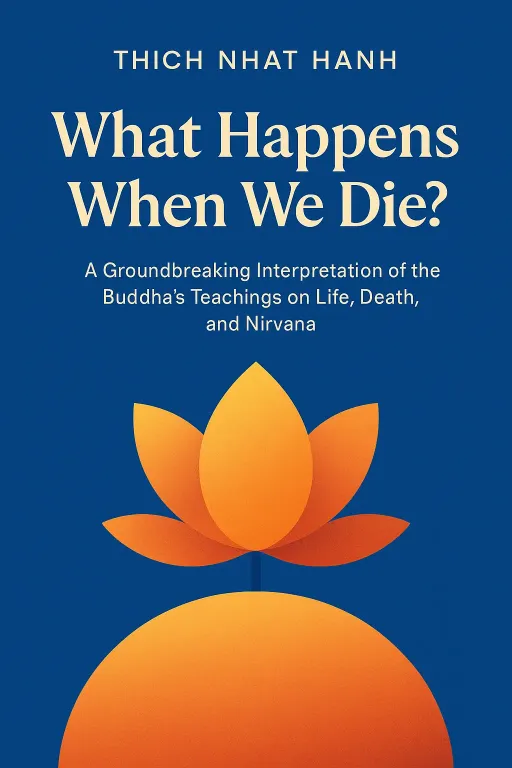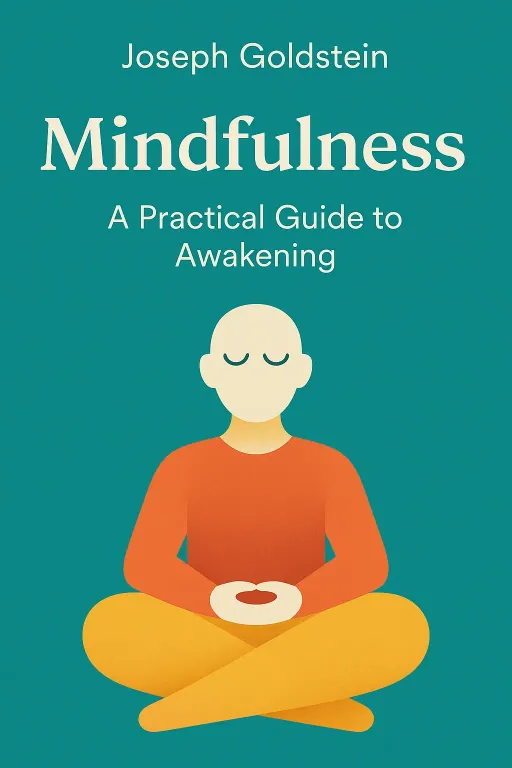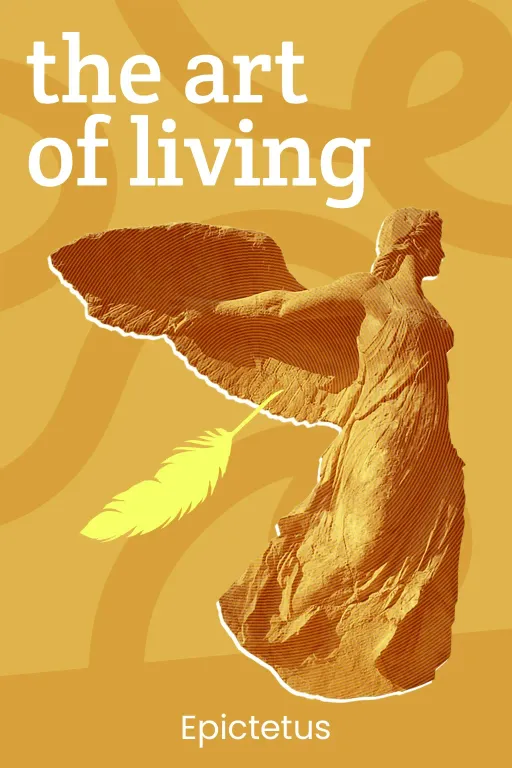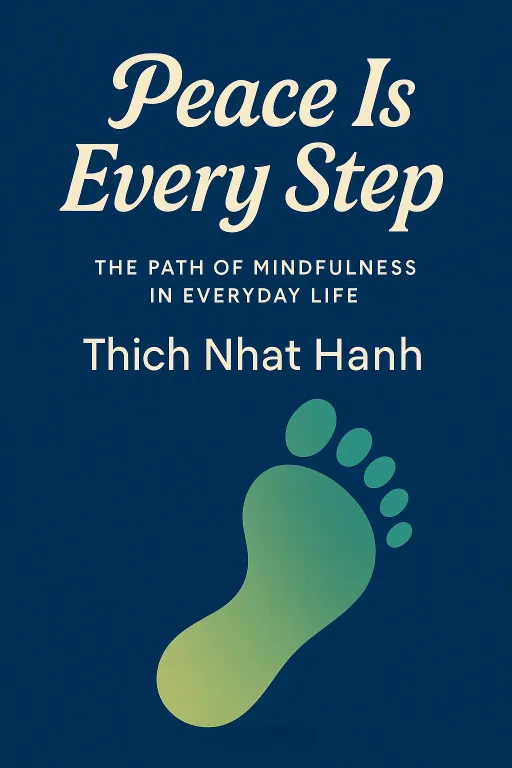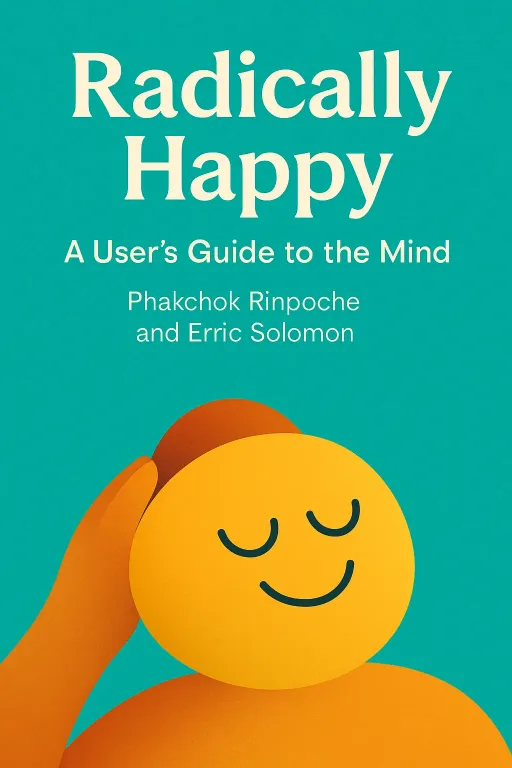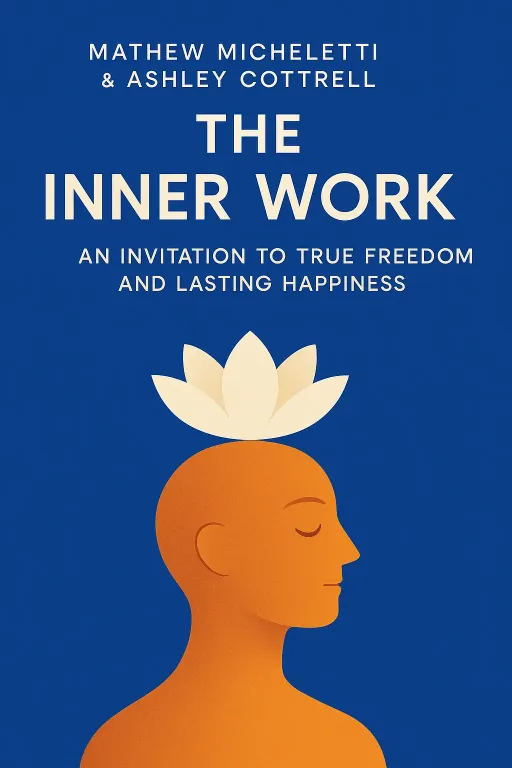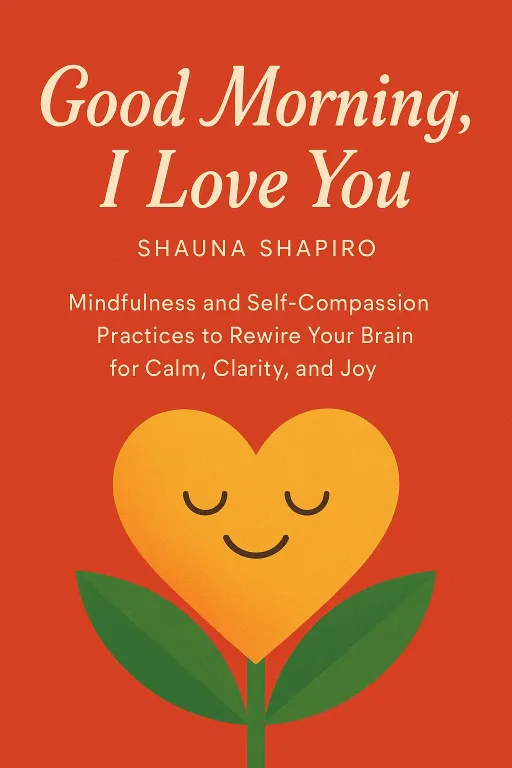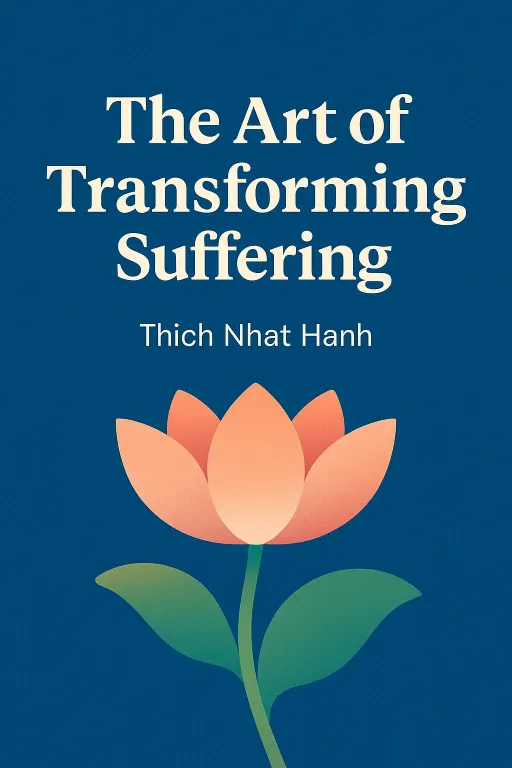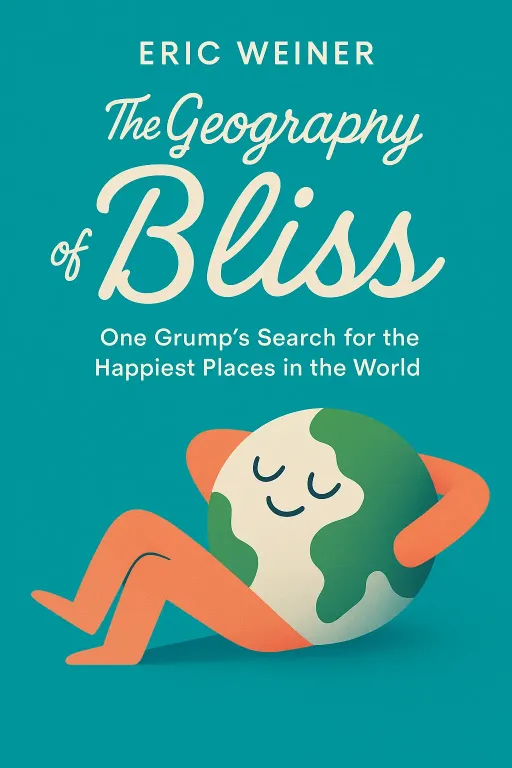
The Atlas of Bliss
11 minOne Grump's Search for the Happiest Places in the World
Golden Hook & Introduction
SECTION
Laura: The entire self-help industry tells you happiness is an inside job. A choice. A mindset. What if that’s mostly wrong? What if the secret to your happiness isn't in your head, but on a map? Sophia: I love that question because it completely flips the script. It suggests that our environment, our culture, the very ground beneath our feet, might have more to do with our joy than we think. Laura: That's the provocative question at the heart of The Geography of Bliss by Eric Weiner. Sophia: And Weiner is the perfect person to ask it. He wasn't some guru on a mountaintop; he was a long-time NPR foreign correspondent, a self-described 'grump' who'd spent years reporting from the world's most unhappy places—Iraq, Afghanistan, you name it. Laura: Exactly. After a career steeped in misery, he decided to flip the script and use his journalistic skills to find the happiest places on Earth. The book became a massive New York Times bestseller and even inspired a TV series, because it taps into that universal question: where do we belong? Sophia: It’s a journey led by a skeptic, which is so much more relatable. He’s not trying to sell you a five-step plan; he’s just genuinely, grumpily curious. Laura: And his first stop takes this idea of 'place' to a fascinating extreme, because he starts by trying to quantify it, to turn happiness into a number.
The Geography of Happiness: Is Joy a Place?
SECTION
Sophia: Okay, so how do you even begin to do that? Does he just show up with a clipboard and ask people, "On a scale of one to ten, how happy are you?" Laura: Pretty much! He heads to the Netherlands, home of Professor Ruut Veenhoven and his World Database of Happiness. It’s this massive, almost comically bureaucratic archive of happiness research from around the globe. They crunch numbers on everything—whether married people are happier than single people, or Republicans happier than Democrats. Sophia: That sounds... very Dutch. Methodical, orderly, and a little bit dry. But did he find the secret to happiness in a spreadsheet? Laura: Not quite. He finds the data interesting, but it’s just data. The real insight comes when he travels to a place that consistently tops those happiness charts, but for reasons that are hard to quantify: Switzerland. Sophia: Ah, Switzerland. The land of chocolate, watches, and... legendary neutrality. It doesn't exactly scream 'joyful abandon.' It screams 'punctual and financially solvent.' Laura: Exactly! And Weiner has this perfect story that captures the essence of Swissness. Years before this trip, he was on a budget safari in Tanzania. It was a disaster. A rock shatters the windshield, then a freak storm hits. His tent collapses, and he and his girlfriend are soaked and miserable. Sophia: Oh, I can picture it. Total chaos. Laura: But then he looks over at the other travelers, a Swiss couple. And amidst this downpour and chaos, their high-tech geodesic tent is standing perfectly. They're inside, warm, dry, probably sipping hot cocoa and balancing their checkbook. Weiner is just filled with this simmering resentment. Sophia: Oh, I would have hated that couple! So competent, so smug. But is that happiness, or just... extreme preparedness? Laura: That’s the million-dollar question. And what he discovers in Switzerland is that their happiness isn't about ecstatic joy; it's about minimizing misery. It’s a culture built on avoiding envy. People don't flash their wealth. Things just work. The trains are on time, the public toilets are pristine. A local doctor he interviews, Dieter, literally attributes Swiss happiness to clean toilets. Sophia: Clean toilets. That’s the secret. I’m not sure whether to be inspired or disappointed. Laura: But it’s deeper than that. It’s about trust. You trust that the train will come, you trust that your neighbor won't be a nuisance, you trust that the system works. This creates a low-grade, stable contentment. It’s not joy, it’s not bliss. Weiner coins a new word for it: 'conjoyment.' Sophia: Conjoyment. I like that. It’s not the wild happiness of a party, but the quiet satisfaction of a well-organized life. But it also sounds a little… boring. Laura: And that’s where Weiner’s journey takes its most counter-intuitive turn. He starts to wonder if boredom itself is a key ingredient.
The Paradox of Contentment: Boredom, Failure, and 'Enough'
SECTION
Sophia: Okay, so the Swiss model is about avoiding the bad stuff. But Weiner finds another country that seems to actively embrace what we'd consider negative experiences, right? This is where it gets really weird and interesting. Laura: It really does. He goes to Iceland. A place that, on paper, should be miserable. It's cold, it's isolated, and for months on end, it's almost completely dark. Yet, it consistently ranks as one of the happiest places on Earth. Sophia: How is that even possible? I get seasonal affective disorder just thinking about it. Laura: Weiner finds that the Icelanders don't just tolerate the darkness; they embrace it. It fuels a massive creative boom. Per capita, Iceland publishes more books than any other country. Everyone seems to be in a band. The darkness forces them inward, toward community and creativity. But the most radical idea he finds there is their relationship with failure. Sophia: What do you mean? Laura: In Iceland, failure isn't stigmatized. It's just part of the process. Because the community is so small and supportive, trying something and not succeeding isn't a source of shame. It's just… what you do. You write a novel, it’s not great. So you start a band. That doesn’t work out. So you try painting. There’s a freedom in it. Sophia: That is so different from the high-stakes pressure we feel. Here, failure is something to be avoided at all costs, or at least spun into a success story later. Laura: Exactly. And Weiner has this personal moment of connection with this idea. He tells the story of how, early in his career, he was fired from a dream job at The New York Times. The executive editor told him his work was "naïve and unsophisticated." It was a crushing blow. But in Iceland, he realizes that naiveté—that willingness to try without being jaded—is actually a cultural strength. Sophia: Wow. So his greatest professional failure was reframed as a virtue. That’s powerful. It’s a culture that values the attempt itself, not just the outcome. It’s about the process, not the product. Laura: And this idea of redefining success connects to another place he visits: Bhutan. This is the tiny Himalayan kingdom famous for inventing the concept of "Gross National Happiness" over Gross Domestic Product. Sophia: Right, GNH. It’s become this buzzword, but what does it actually mean in practice? Laura: For the Bhutanese, a huge part of it is the concept of 'enough.' They actively prioritize things like environmental preservation and cultural traditions over pure economic growth. They limit tourism. They banned plastic bags decades ago. It’s a society that has collectively decided that there’s a point where more money and more stuff doesn't equal more happiness. They know what is enough. Sophia: The concept of 'enough.' That feels like the most radical idea of all in our world of endless growth and consumption. To just… stop. To be content. Laura: It’s a profound challenge to the Western way of life. And to truly understand why these ingredients—trust, community, embracing failure, knowing 'enough'—are so vital, Weiner does something brilliant. He goes to a place where they are completely absent.
The Unhappy Blueprint: What Misery Teaches Us About Bliss
SECTION
Sophia: He goes looking for unhappiness? That’s a bold move for a self-proclaimed grump. It could be a one-way trip. Laura: He travels to Moldova, which at the time was ranked by researchers as the least happy country in the world. He wants to see what happiness looks like in its absence. Sophia: And what does he find? What does a country-wide lack of happiness feel like? Laura: Bleak. He describes a pervasive atmosphere of mistrust and suspicion. People don't trust the government, they don't trust their neighbors, sometimes they don't even trust their own families. There's a sense of national learned helplessness. He tells this story of being on a city bus that breaks down. The passengers just get off, silently, and start walking. No complaining, no anger, just resignation. Sophia: That’s heartbreaking. It’s like the entire country has collectively sighed and given up. The psychological concept of learned helplessness, but on a national scale. Laura: Precisely. They’ve been beaten down by history, by corruption, by poverty, for so long that they’ve lost the energy to even hope for better. There’s a local phrase, "This is Moldova," which is used as a shrug to explain away any problem. It’s a culture of accepted misery. Sophia: And this is where the contrast with other places becomes so sharp. The Swiss have trust. The Icelanders have community. The Bhutanese have a shared purpose. Moldova has none of that. Laura: And to drive the point home, he also looks at Qatar. It’s the polar opposite of Moldova—fabulously, obscenely wealthy. They can buy anything they want, from a World Cup to the world’s most expensive art. But Weiner finds a profound emptiness there. A society built on oil money and foreign labor, with a fragile sense of identity. They have everything, but it doesn't add up to happiness because the foundational elements of culture and connection are missing. Sophia: Wow. So Moldova shows us that without trust, society crumbles. And Qatar shows that you can't just buy a soul for your country. These unhappy places are like a photographic negative—they show us the shape of happiness by its absence. The empty spaces reveal what’s most important. Laura: Exactly. You see that happiness isn't about what you have. It’s about the social fabric. It's about trust, a sense of belonging, and a belief that your actions matter.
Synthesis & Takeaways
SECTION
Sophia: So after this global tour of joy and misery, what was Weiner’s grand conclusion? Did the grump find the secret to happiness? Laura: His conclusion is both simple and profound. There is no single secret. Happiness isn't one ingredient; it’s the arrangement of ingredients. As he puts it, money matters, but not as much as we think. Relationships, trust, and a sense of purpose matter more. He quotes one researcher who says, "The quality of a society is more important than your place in that society." Sophia: I love that. It means it’s better to be a small fish in a happy, healthy pond than a big fish in a toxic, miserable one. Laura: And he also comes to appreciate the role of misery. A life without challenges, without grit, without some darkness, is a shallow one. We need those things to spur our imagination and appreciate the light. He learns to accept the world's messiness. Sophia: It makes you look around your own city, your own neighborhood, and ask: What is the 'geography of bliss' right here? What are the unwritten rules of happiness in our own culture? Are we more like Switzerland, or a little bit like Iceland, or god forbid, a touch of Moldova? Laura: Exactly. It’s a powerful lens for looking at your own world. We'd love to hear what you think. What makes your place happy, or unhappy? Let us know on our social channels. We're always curious to hear your stories. Sophia: It’s a journey worth taking, even if it’s just in your own mind. Laura: This is Aibrary, signing off.
